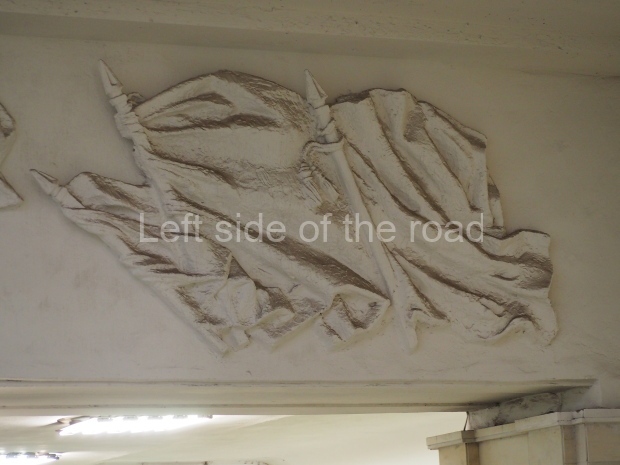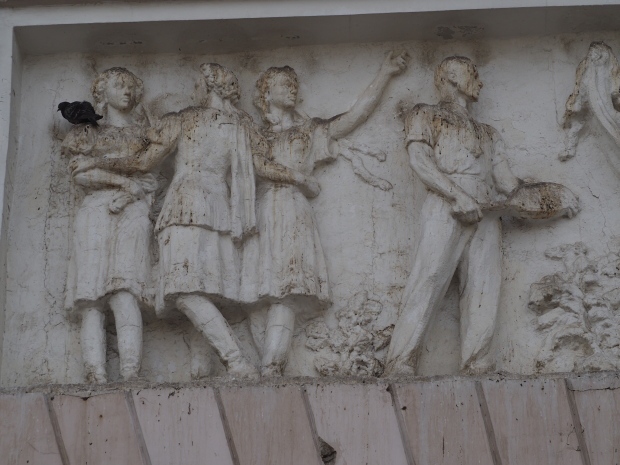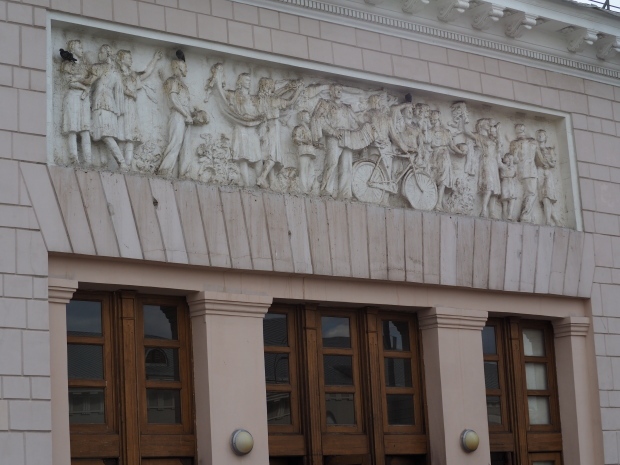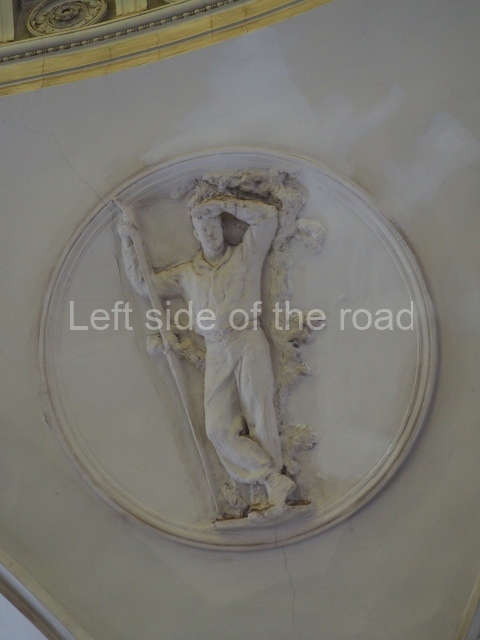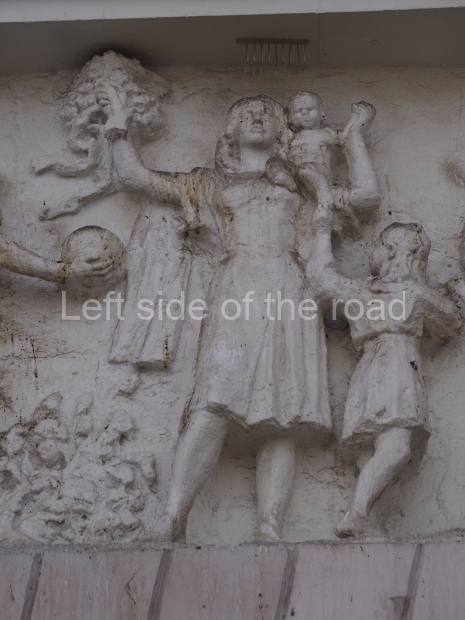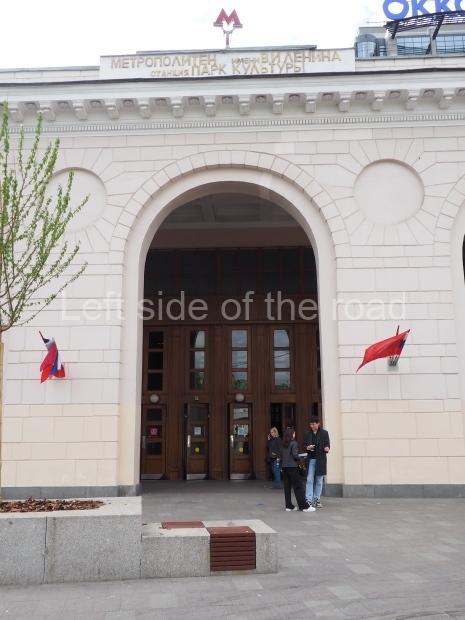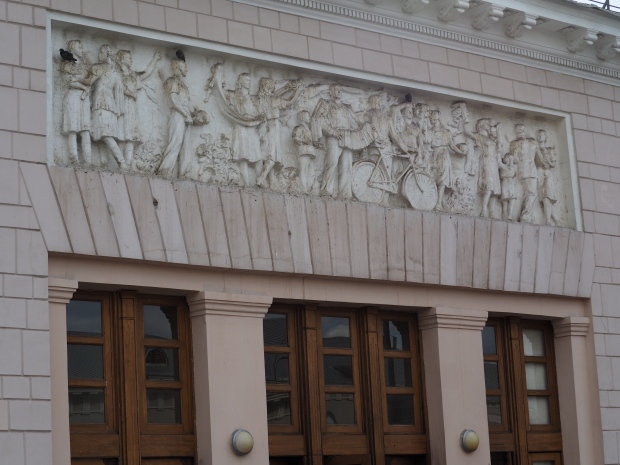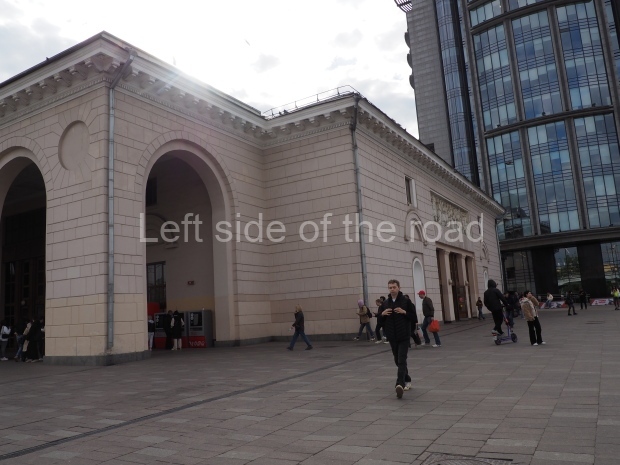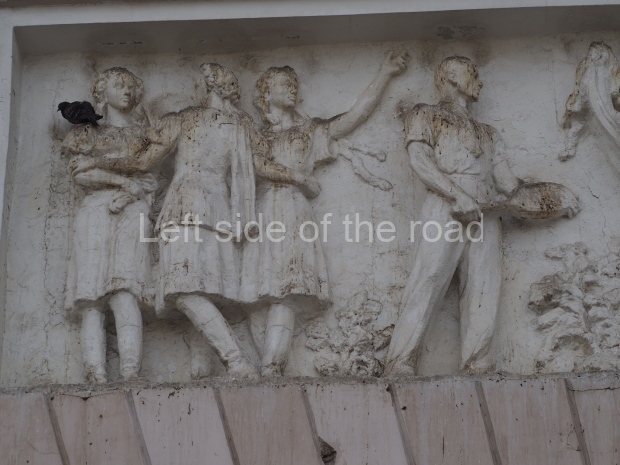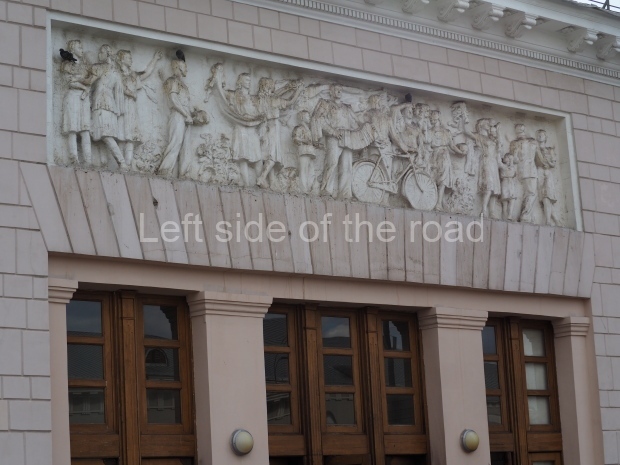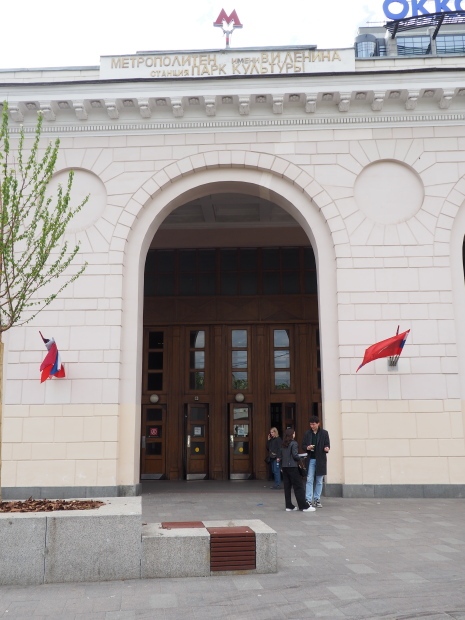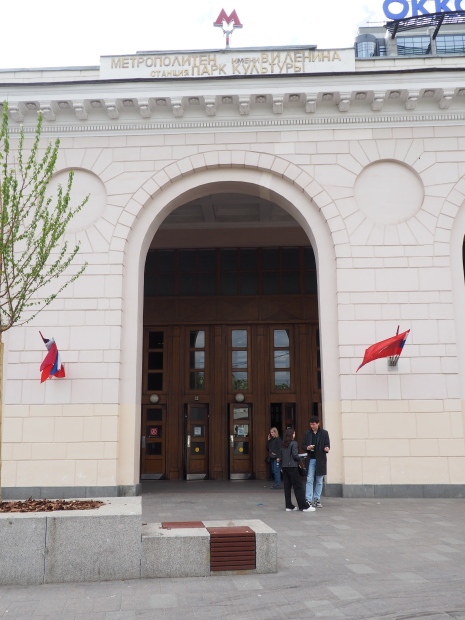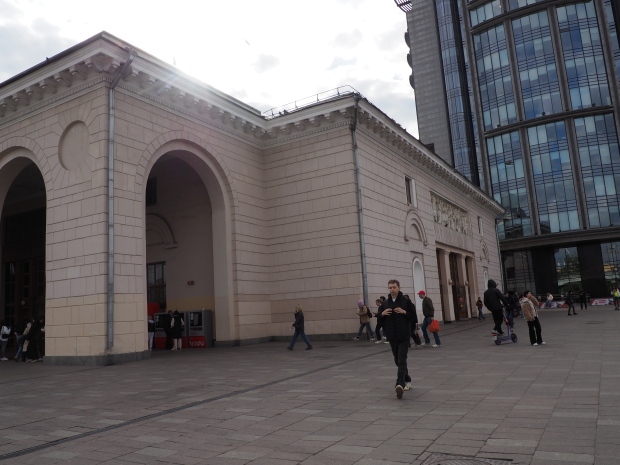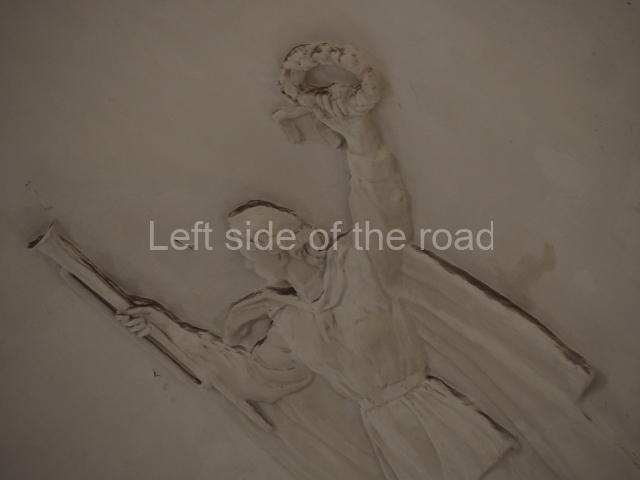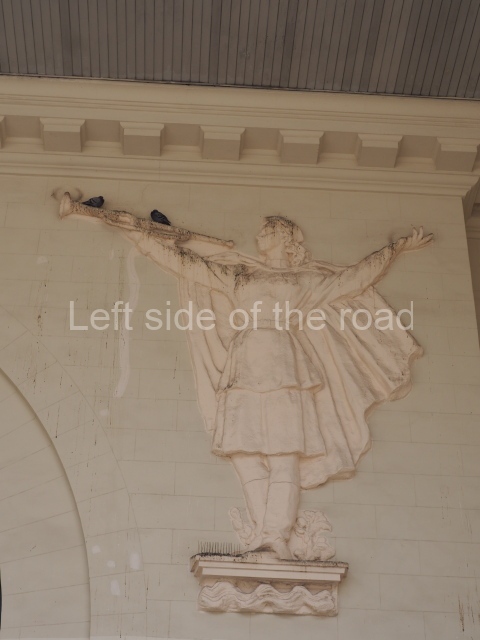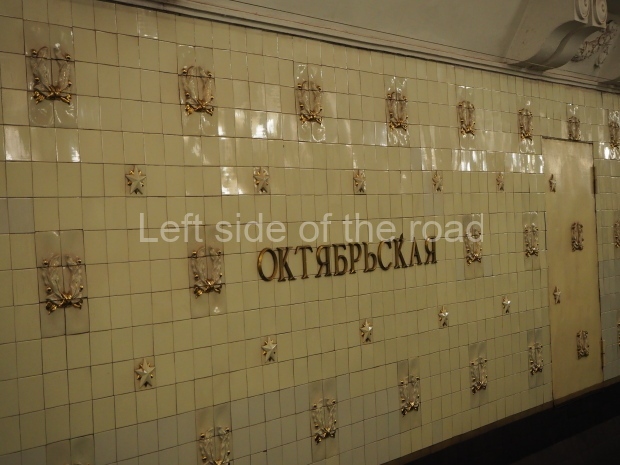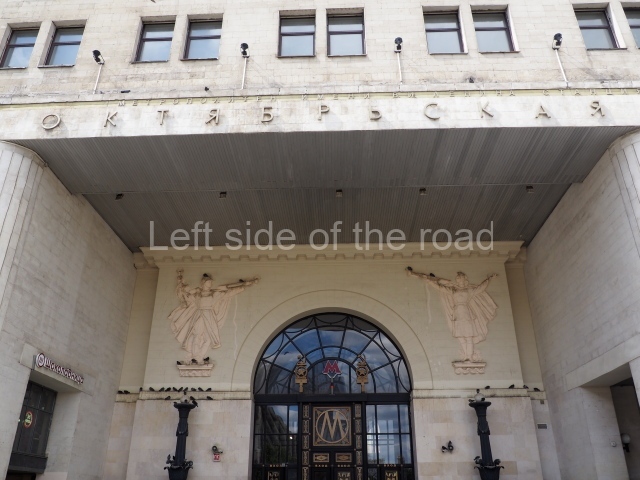
Park Kultury – Line 5 – by Alex ‘Florstein’ Fedorov
More on the USSR
Moscow Metro – a Socialist Realist Art Gallery
Moscow Metro – Park Kultury – Line 5
Park Kultury (Парк культу́ры) is a Moscow Metro station in the Khamovniki District, Central Administrative Okrug, Moscow. It is on the Koltsevaya line (Circle line), between Oktyabrskaya and Kievskaya stations. Park Kultury opened on 1 January 1950.

Park Kultury – Line 5 – 02
The station is a standard pylon tri-vault, that was built in the flamboyance of the 1950s. Architect Igor Rozhin (who would then design the Luzhniki Stadium) applied a classic sport recreational theme to match the connotation with the ancient-Greek inspired transfer station. This includes large and imposing pylons faced with grey marble that came directly from Georgia. The floor is laid with black and grey granite tiles imitating a carpet. The walls are faced with white marble and labradorite. Decoratively the station contains 26 circular bas-reliefs by Iosif Rabinovich which depict sporting and other leisure activities of the Soviet youth.

Park Kultury – Line 5 – 03
The white vault of the station contains complex geometry which repeats that of the arches, and along the apex are suspended a set of intricate hexagonal chandeliers. Rozhin later admitted that he made a grave error in choosing to place the chandeliers amid the arches, not between them, that way he would have avoided giving the bas-reliefs a double shadow. At the end of the station is a massive marble wall with a small profile bas-relief of Maxim Gorky. The station was initially called ‘Park Kultury imeni Gorkogo’ (Парк Культуры имени Горького) but during the 1980 Moscow Olympics this was shortened as the Russian announcements were repeated in English and French during the games. After the Olympics, the shorter name was retained. The original long form appears in bronze letters next to Gorky’s image.

Park Kultury – Line 5 – 01
The station has a large imposing vestibule located on the corner of Komsomolsky Avenue and Garden Ring next to the Krymsky Bridge which was co-designed with Rozhin by Yelena Markova. Originally Rozhin planned for an extended arcade modelled after Russian trading rows, but this was rejected in favour of a more traditional design. The large building features a central dome, and inside has four bas-reliefs of sportsmen, and another one on its portico outside (all by G. Motovilov). The vestibule also doubles as a transfer to the Sokolnicheskaya line.

Park Kultury – Line 5 – 04
As the station was initially terminus, a set of reversal sidings exist in front of it, also from them runs a service branch to the Sokolnicheskaya line which was used initially as the primary way of transferring rolling stock to the station before the opening of the Koltsevaya line’s depot in 1954.

Park Kultury – Line 5 – 05
On 14 January 2011, Moscow Metro authorities announced their plans to close the station on 5 February 2011 so as to replace the ageing escalators. Park Kultury was supposed to open in December 2011 but the date was shifted to 30 March 2012 due to delays in shipping new escalators and opened the station on 28 April.
Text above from Wikipedia.
Park Kultury, Circle Line
Date of opening;
1st January 1950
Construction of the station;
deep, pier, three-span
Architect of the underground part;
I. Rozhin
Transit to Station Park Kultury of the Sokolnicheskaya Line
On the face of it, Park Kultury seems to be a dark station, particularly compared with bright mosaic and festive Kievskaya. The massive pylons are faced with very original marble from the Fominskoye Deposit of the Middle Ural, first used in the Moscow Metro. It is very decorative stone but of moderate and subdued shade. It has a streaky, spotted, and folded pattern of grey, dark grey, and greyish-yellow colours. The parts of walls with doors to technical facilities are faced with the same marble. The upper parts of the walls are faced with dark grey marble from the Ural Karkodinskoye Deposit with inserts of mat black marble of the Armenian Davalu Deposit, while the socles are decorated with deep black labradorite with sparkles of southern-night-sky colour from the Volynskoye Deposit.
The floor of the platform is covered with grey granite and that of the central hall is with black diabase. It is also decorated with six squares of white and black marble with meanders.
The station is illuminated with chandeliers in the form of large ‘Chinese lamps’ suspended from the ceiling and four torchieres of the Empire style. The small metal bas-relief of A. Gorky and inscription ‘Gorky Park of Culture and Rest’ made of metal letters are on the blind end of the station. The letters are regularly stolen. There are three long wooden benches with the legs and massive elbow-rests of white marble at the ends of each platform.
Although the station has restrained and chamber architecture, it is rather cosy, and the abundance of black marble in the decoration of the walls and ceiling does not spurn or make it cold. On the contrary, this creates the feeling of a warm summer evening in the Gorky Park.
The round marble medallions (sculptor S. Rabinovich) in metal frames are put in the niches of the pylons on the sides of the central hall and platforms tell how one can have a good time in the park. There are totally 26 medallions on 14 different subjects. It is needed to look over the platforms to observe all of them because the central hall has not all of them – no ‘Skiers’ and ‘Music lessons’.
Let’s go from the last carriage in the direction of station Kievskaya, reach the end of the platform, then transit to the other platform, and go backward.
‘Music lessons’ – A young girl violinist is before a music stand and a female teacher analyses what she has played.
‘Chamber concert’ – A female singer plays music by score. There are flowers at her legs.
‘Flower-growing’ – A little girl (with a pioneer tie and a basket in her hand] and a girl admire flowers.
‘Chess playing’ – A father and his son play chess. The mother watches them playing. The boy is engrossed in thoughts and the father moves pawn.
‘Aircraft modelling’ – Two boys, one with pliers in his hand, the other with a plane-table, admire the model they’ve just made.
‘Ballet’ – Ballerina dances on the stage. Flowers are at her legs.
‘Lovers’ – A young boy leans on a tree and, holding a book in his hands, reads poems to his girlfriend who sits in a wicker chair. Such chairs were in the alleys of the Gorky Park until the end of the 1960’s.
‘ Mode1ling’ – Two boys are carried away with the construction of a working model of a lifting crane.
‘Football-players’ – A sportsman stands with a ball in his hands.
‘Dances’ – A sailor waltzes with a girl. He puts his arm round her waist but keeps a distance. A girl gracefully holds the lap of her dress with her finger tips.
‘Folk dances’ – A man, sitting on a stump, plays accordion and two women sing and dance.
‘Skating rink’ – A young boy and girl are evidently quite skilled in skating based on fancy poses they have stiffened. Pay attention to their dress – the girl’s skirt and ribbons in her hair and the boy’s baggy trousers put in spats.
‘Tennis’ – A girl with a racket in her hand, a tennis-ball is at her legs.
‘Skiers’ – A man and a woman have prepared for skiing. The man ties up his boot, while the woman waits for him.
The long escalator serves for the transit to Station Park Kultury of the Sokolnicheskaya Line and exit to the city. It leads to the common ground entrance hall of both stations.
Text from Moscow Metro 1935-2005, p86/7
Location;
GPS:
55.7357°N
37.5915°E
Depth:
40 metres (130 ft)
Opened:
1 January 1950
More on the USSR
Moscow Metro – a Socialist Realist Art Gallery










































